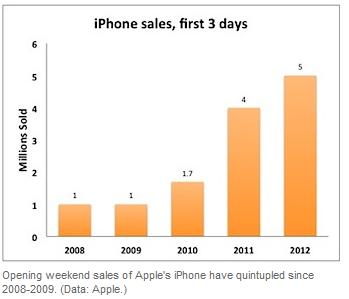Computerworld - Apple today said it had sold more than 5 million iPhone 5 smartphones during the opening three-day weekend of sales, a 25% increase over last year's launch of the iPhone 4S.

"Demand for iPhone 5 has been incredible and we are working hard to get an iPhone 5 into the hands of every customer who wants one as quickly as possible," said Apple CEO Tim Cook in a Monday statement.
The 5 million includes units sold through its own retail stores, those through its carrier partners' stores, and the ones that were delivered Friday or Saturday from pre-sales on its online store which started Sept 14.
Apple began selling the iPhone 5 early Friday, Sept. 21.
Analysts noted that the 5 million, while up from the three-day total of 4 million last year, fell short of their bullish estimates.
"The iPhone 5 three-day volume missed our estimate of 6 million to 6.5 million, which we believe is driven by availability as many stores that we contacted this weekend were sold out in the first 24 hours," said Brian White of Topeka Capital Markets, in a note to clients today.
Brian Marshall, a financial analyst with ISI Group, noted that his opening weekend estimate had been 6 million to 8 million.
Shortages were expected -- Apple has always had trouble meeting demand at iPhone launches -- but even Cook cited the problem today, confirming that Apple had run through its stock.
"While we have sold out of our initial supply [emphasis ours], stores continue to receive iPhone 5 shipments regularly and customers can continue to order online and receive an estimated delivery date," Cook said. "We appreciate everyone's patience and are working hard to build enough iPhone 5s for everyone."
White attributed the lower-than-expected sales to weak inventory, and said Apple could have sold more than the 5 million iPhones if it had had them.
Marshall, however, said that it was greater-than-expected demand, not a planning snafu on Apple's part, that drove the out-of-stock situation. "With retail shortages and 'available to ship within 3-4 weeks' on the Apple Store, we view this as primarily demand-driven and believe supply constraints are better than feared," he said in a note to clients.
Marshall also pointed out that the 5 million does not count in-transit iPhone 5s -- those that have been paid for, shipped from China, but not yet delivered -- which he estimated to be in the millions.
Whatever the cause -- too-short supply or heavy demand -- both analysts forecast significant sales of the iPhone 5 this quarter, which ends Sept. 30, and the year's final quarter.
"Apple clearly has a blockbuster on its hands," said White.
Cook also claimed that 100 million devices -- iPhones, iPads and iPod Touches -- had been upgraded to iOS 6 since the Sept. 19 debut of that operating system.
That was four times the 25 million devices upgraded to iOS 5 in the first five days of its availability in early October 2011. "We believe this suggests reports of dissatisfaction with Apple's new Maps application will not be a deterrent to adoption [of iOS 6]," said Marshall.
Apple's dumping of Google Maps and replacing it with its own mapping and navigation technology has raised a ruckus among customers and many pundits, and prompted rivals to run television ads poking fun at the inaccuracy of Apple's Maps app.
As of early Monday, Apple's online store showed a "3-4 weeks" delay between ordering and shipping a new iPhone 5. One Computerworld staffer who ordered a 16GB Verizon iPhone 5 on Sept. 21, for example, was told that the smartphone would not arrive until Oct. 23-29. Another, who pre-ordered on Sept. 14 just hours after Apple ran out of stock, is to receive his 64GB AT&T iPhone 5 on Sept. 28.
White acknowledged the supply issues, but believes they will improve over time.
"There's always yield issues with a new product," said White, who called the display module the "gatekeeper" of supplies. "That and the labor to assemble these things," he said in an interview. "But [the shipping] delays will come down before the end of the year. They'll be back to one to two weeks, maybe to just one week by the end of the year."





